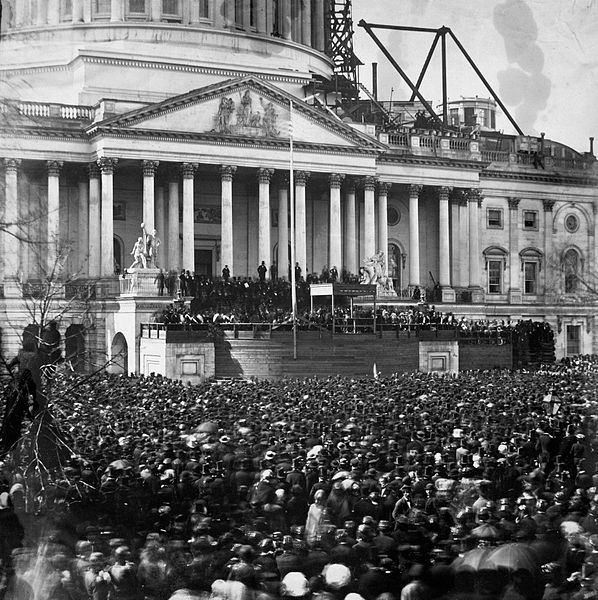On December 22, 1847, the Speaker of the House of Representatives recognized a young, freshman congressman from Illinois named Abraham Lincoln who wished to speak about the ongoing war with Mexico. The lanky, awkward, high-voiced westerner raised doubts regarding President James Knox Polk’s conduct in starting the war, proposing eight resolutions that challenged Polk to provide evidence for his stated reason for doing so. Polk had said that Mexican troops had shed “American blood on American soil” and forced his hand, but Lincoln challenged this assertion. Lincoln insinuated that the fatal encounter between Mexican and American troops had in fact occurred in a contested region between the Nueces River and the Rio Grande, a region to which Mexico had stronger claims than the United States. With his demand that Polk prove that the exact location of the engagement had been on American soil, Lincoln’s proposals became known as the “Spot Resolutions.” This speech brought Lincoln into the national spotlight for the first time, and it proved key in the development of his future career.

Lincoln’s Spot Resolutions provoked a storm of intense reactions from fellow politicians and newspapers alike. Many of these criticisms compared Lincoln unfavorably with the former holder of his Congressional seat, John Jay Hardin, who had served as a militia commander in the war with Mexico and had been killed in action earlier in 1847 at the Battle of Buena Vista. Missouri Congressman John Jameson, for one, responded in a speech of his own a few days later with the exhortation, “The gentleman from Illinois, from the Hardin and Baker district, took a strange position before the American Congress for such a Representative. Yes, sir; look back and see what your Hardin did.” The Illinois State Register gave Lincoln the nickname “Ranchero Spotty,” connecting him with Mexican guerrilla fighters who preyed on American soldiers that left camp alone. The Democratic Peoria Press heckled, “What an epitaph: ‘Died of the Spotted Fever.’ Poor Lincoln.” Even Lincoln’s friend and law partner, William Herndon, wrote to him criticizing his Spot Resolutions speech as “political suicide,” while gatherings of citizens in his home district in Illinois denounced his “base, dastardly, and treasonable assault upon President Polk,” labeling him “this Benedict Arnold of our district.” This outpouring of public sentiment contributed greatly to Lincoln’s defeat in his reelection bid the next year, putting a hold on his time in the national spotlight.
Though many people disagreed with the ideas expressed by Lincoln in his Spot Resolutions speech, others recognized his great capacity for oration. This sentiment permeated across the nation. The Missouri Republican wrote that the speech was “one of great power, and replete with the strongest and most conclusive arguments. He commanded the attention of the House, which none but a strong man can do.” The Baltimore Patriot opined that “evidently there is music in that very tall Mr. Lincoln.” In Massachusetts, a Solomon Lincoln wrote to his congressman that “[O]ur attention has been arrested in this quarter of the country by the able speech of Hon. Mr. Lincoln of Illinois made this session, in the House of Representatives, and it has been a source of gratification to those bearing his name to know that the old stock has not degenerated by being transplanted. On the contrary, it exhibits fresh vigor in the fertile soil of the West.” Lincoln’s speech won him acclaim from a range of outlets, a real achievement for a young, first-term congressman.
Abraham Lincoln may have only served one term as a congressman before his 1860 nomination for president on the Republican ticket, but in that brief time he put himself on the map with his Spot Resolutions speech. The speech was far from an unmitigated success, as it provoked a political firestorm that both failed to stop Polk’s war in Mexico and largely led to Lincoln’s defeat in his reelection campaign. It became such a memorable strike against Lincoln that in his debates with Stephen Douglas more than a decade later, the “Little Giant” would ask the audience its thoughts on Lincoln’s efforts “to dodge the responsibility of [the Republican Party] platform because it was not adopted in the right spot” and refer to him as “Spotty Lincoln.” Yet, the wide range of reactions from across the United States demonstrated that Lincoln had the power to craft his orations in such a way that they left a mark on people, an ability that proved highly useful in his later political career. The Spot Resolutions were thus integral in the making of Abraham Lincoln, perhaps ironically so for a man who would later preside over the most catastrophic war in American history. The elevation of his name into the national consciousness as a man of great ability and conviction at such an early point in his career set the stage for his eventual meteoric rise, culminating in his election to the presidency. As such, Lincoln’s Spot Resolutions speech deserves greater recognition among Civil War historians and enthusiasts alike.
Sources
DeRose, Christopher. Congressman Lincoln: The Making of America’s Greatest President. New York: Threshold Ed., 2014.
Fisher, Louis. “The Mexican War and Lincoln’s ‘Spot Resolutions’.” Washington: Law Library of Congress, 2009.
Greenberg, Amy S. A Wicked War: Polk, Clay, Lincoln, and the 1846 U.S. Invasion of Mexico. New York: Knopf Doubleday Publishing Group, 2013.
Merry, Robert W. A Country of Vast Designs: James K. Polk, the Mexican War, and the Conquest of the American Continent. New York: Simon & Schuster Paperbacks, 2011.



















